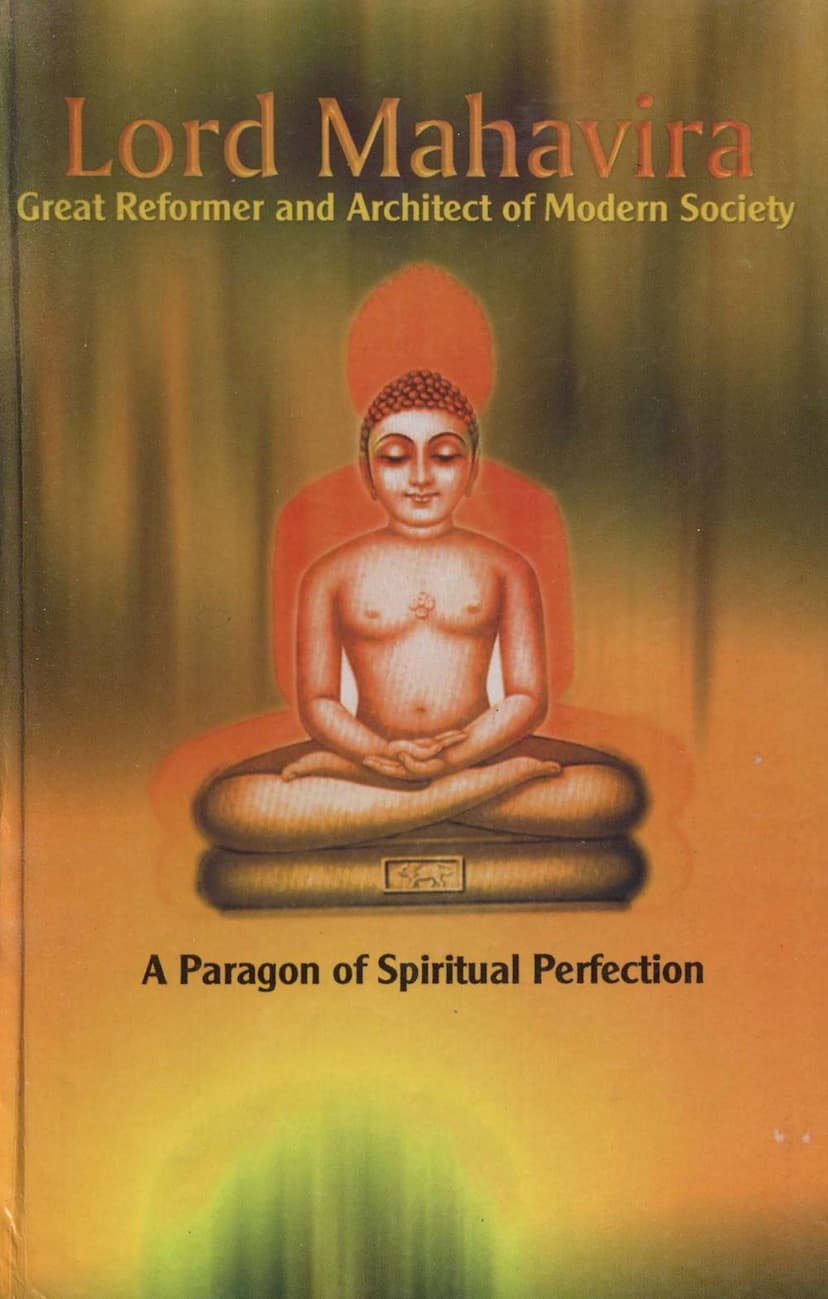Lord Mahavira
Added to library: September 2, 2025

Summary
Here's a comprehensive summary of the Jain text "Lord Mahavira" by C.R. Bhansali, based on the provided pages:
The book "Lord Mahavira: Great Reformer and Architect of Modern Society," authored by Dr. C.R. Bhansali, aims to present the profound teachings of Lord Mahavira to a world plagued by violence, conflict, and disharmony. Despite advancements in science and technology, true happiness remains elusive due to the degradation of human values. The book highlights the urgent need to understand Mahavira's value-based message, emphasizing non-violence, equality, universal brotherhood, and compassion. Published in 2001, the book is a compilation inspired by Acharya Tulsi, structuring Mahavira's teachings into 11 chapters, each with 11 sub-chapters, and each sub-chapter elaborating on 11 key points.
Author's Background: Dr. C.R. Bhansali is presented as a deeply religious individual, influenced by his parents and a strong educational background. He is a successful businessman and holds a Ph.D. He is actively involved in educational, cultural, and social organizations, having served as Ex-President of Jain Vishwa Bharati and Jai Tulsi Foundation. He acknowledges Acharya Shri Mahaprajna as a significant inspirational force for his writing.
Core Teachings and Themes: The book systematically explores Lord Mahavira's philosophy across various aspects of life and spirituality. Key themes and concepts discussed include:
-
Spiritual Discipline: This emphasizes the soul as the central point of spiritual discipline, achieved through Right Faith, Right Knowledge, and Right Conduct. It highlights Mahavira's tenets of right eating, filtered water, worship of the true God, non-violence, and detachment. It also emphasizes that man is the architect of his own destiny, with karma being the cause of worldly bondage and misery.
-
Pathway to Liberation (Moksha): This section details the Jain belief in the self's capacity for liberation, attainable through the "Three Jewels": Right Faith, Right Knowledge, and Right Conduct. It defines liberation as the dissociation and destruction of all karmas, leading to a state of infinite knowledge, perception, bliss, and power. The text also outlines the importance of recognizing the six fundamental substances of Jainism.
-
Self Concept: The book delves into the nature of the soul (Jiva) as eternal and sentient, distinct from material objects. It contrasts the Jain doctrine of the self with those of Brahmanism and Buddhism, highlighting Buddhism's doctrine of "non-self." The importance of introspection, self-restraint, and the conquest of the self over external enemies is stressed.
-
Conquest of Passions: Mahavira's teachings on overcoming the "deadly passions" – anger, pride, delusion, illusion, desire, wrong faith, and possessiveness – are elaborated. These passions are identified as the root cause of karma and misery, and their renunciation is presented as crucial for spiritual progress and liberation.
-
Doctrine of Karma: This section explains the Jain theory of karma as a fine aggregate of material particles that bind the soul, obscuring its inherent qualities. It details the nature, types, duration, intensity, and states of karma, emphasizing that karma is an instrumental cause, with the self being the principal cause of its attraction and manifestation.
-
Conquest of Mind: The book describes the mind as a powerful, often unruly, entity that needs to be controlled through right knowledge and righteous meditation. A pure mind is seen as essential for spiritual progress and achieving a balanced life, free from attachment and passion.
-
Meditation: Meditation is presented as fundamental to spiritual practice, enabling self-realization, concentration, and peace. It emphasizes living in the present moment and practicing righteous meditation to overcome vices and purify the consciousness. The book also discusses the concept of environment, the blind race for progress, and the solutions to problems like pollution through restraint and adherence to Ahimsa.
-
Wisdom: This chapter summarizes Mahavira's philosophy as a harmonious blend of spiritualism and materialism, emphasizing peace, restraint, and purity of means. It touches upon human nature, the four purusharthas (Dharma, Artha, Kama, Moksha), the importance of self-observation, the path of Sadhana, and the reconciliation of science and spiritualism. Mahavira's economic concepts, the avoidance of arms races, and the resolution of poverty and unemployment through moral principles are also discussed.
-
Precepts on Learning: The importance of continuous spiritual study (Svadhyaya), equanimity (Samayika), meditation (Dhyana), humility, discretion, and restraint in speech is highlighted. The text emphasizes that true learning leads to the destruction of karmas and the attainment of self-realization.
-
Code of Conduct: The book outlines the fundamental Jain vows (Mahavratas and Anuvratas) and the ethical principles expected of followers, including non-violence (Ahimsa), truthfulness (Satya), non-stealing (Asteya), celibacy (Brahmacharya), and non-possession (Aparigraha). Austerity, forgiveness, equipoise, non-attachment, modesty, and charity are presented as crucial virtues for spiritual growth.
Lord Mahavira's Healthy Approach: The final section, drawing from Acharya Mahaprajna, discusses Mahavira's perspective on health. It differentiates between the mind and the "Chitta," suggesting that the purity of Chitta, Bhava (emotional states), and mind is fundamental for good health. Impurities in these aspects are seen as the root cause of psychosomatic illnesses. The text advocates for a balanced lifestyle, incorporating spiritualism, morality, and self-restraint, alongside proper diet, to achieve holistic well-being.
In essence, the book serves as a comprehensive guide to understanding and applying the timeless teachings of Lord Mahavira for individual spiritual growth and the betterment of society, emphasizing a life of moral rectitude, non-violence, and inner purification.